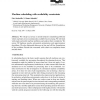517 search results - page 43 / 104 » Approximation Algorithms for Scheduling with Reservations |
EUROPAR
2007
Springer
15 years 6 months ago
2007
Springer
The distributed nature of the grid results in the problem of scheduling parallel jobs produced by several independent organizations that have partial control over the system. We co...
103
click to vote
ICC
2008
IEEE
15 years 6 months ago
2008
IEEE
—MIMO links can significantly improve network throughput by supporting multiple concurrent data streams between a pair of nodes and suppressing wireless interference. In this pa...
PRL
2007
14 years 11 months ago
2007
We introduce a new method for the recognition of partially occluded objects represented only by their contours. Object description, which stems from the inflection point detectio...
ACTA
1998
14 years 11 months ago
1998
We will give a survey on results related to scheduling problems where machines are not continuously available for processing. We will deal with single and multi machine problems an...
ML
2002
ACM
14 years 11 months ago
2002
ACM
TD() is a popular family of algorithms for approximate policy evaluation in large MDPs. TD() works by incrementally updating the value function after each observed transition. It h...



